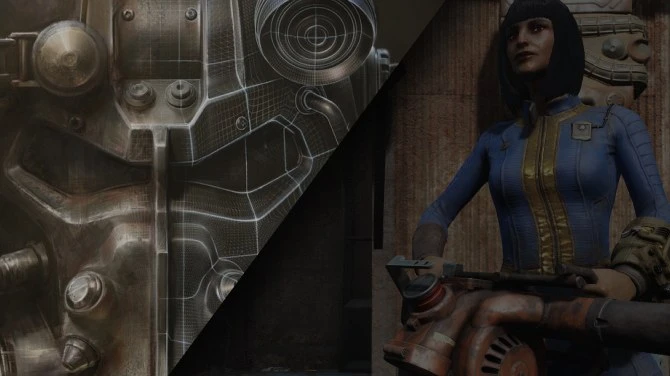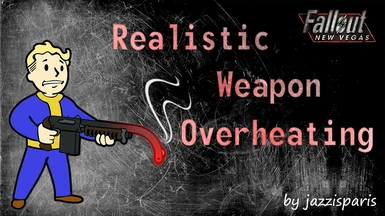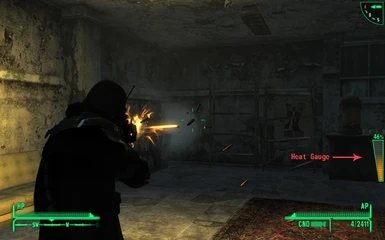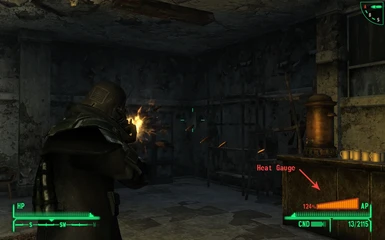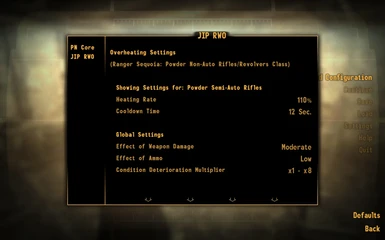About this mod
This mod simulates the real-world, adverse effects of continuous, intensive fire which, if sustained long enough, can cause a firearm to overheat. An overheated weapon will gradually become extremely unreliable and much more prone to malfunctioning (jamming); Its accuracy will suffer, and its condition will begin to deteriorate much faster.
- Requirements
- Permissions and credits
- Changelogs
This mod simulates the real-world, adverse effects of continuous, intensive fire which, if sustained long enough, can cause a firearm to overheat.
It is intended, and probably best suited for hardcore players and/or realism fanatics, as it will impose further limitations on using projectile weapons, at times making the game more challenging.
An overheated weapon will gradually become extremely unreliable and much more prone to malfunctioning (jamming); It may cook-off ammunition rounds and fire spontaneously; Its accuracy will suffer, and its condition will begin to deteriorate much faster, intensifying the negative effects on spread and damage.
All projectile-type weapons (both guns and energy weapons) will be subjected to these effects (with a few exceptions, explained below).
Introduction, or: Weapon Overheating 101
Heat dissipation has always been an important consideration in the design of firearms. This is especially true with automatic firearms, capable of firing hundreds (sometimes even thousands) of rounds every minute. Well, at least in theory.
In order to get some perspective, let's look at the M16 rifle. It can fire up to 950 rounds/minute. Quite impressive, for an assault rifle. However, according to the U.S. Army M16 rifle manual, firing 140 rounds, rapidly and continuously, will raise the temperature of the barrel to the "cook-off point". That is, assuming the gas tube hasn't failed before that could even happen.
Not surprising, considering the levels of energy released when a weapon is fired. By the time the bullet is ejected from the muzzle, roughly 10% of this energy is already spent, converted to heat and conducted to the weapon's parts. If not allowed to disperse, this excess heat will continue to build up and can, potentially, reach as high as 1200 degrees centigrade (about 200 degrees shy from the melting point of steel).
There are two major contributors to this accumulating heat. They constitute two of the most basic principles by which modern-day firearms work. Heat is conducted to the weapon by high pressured gases, product of the combustion of gun powder stored in the cartridge. It is these gases that give the bullet its linear momentum that will propel it on its trajectory. More heat is produced by friction between the bullet and the barrel's walls, as the former is pushed outwards by the pressure of the gases.
The effects of overheating on a firearm result from certain properties of matter and the way it is affected by temperature (as explained by the laws of thermodynamics). As temperatures rise, matter expands (grow in volume). Steel, at very high temperature, tends to deform, weaken and lose much of its elasticity. All these effect the weapon in several ways:
- Overall, accelerated deterioration of the weapon's condition, as the steel begins to lose some of its most valuable traits.
- The increased friction between the weapon's components, especially the moving, mechanical parts, greatly increases the chance the weapon will jam and malfunction. The strain may cause these parts to bend, even break.
- More pressure is exerted on the bullet by the hot barrel. The added friction means more energy is wasted, as the bullet loses momentum. This results in a small (albeit significant) decrease in accuracy, and also in a feedback effect - more energy is lost and converted to heat.
- In closed-bolt type weapons, the residual heat conducted to the cartridge loaded in the chamber can cause the propellant inside to combust, even though the primer has not been struck, thus firing the chambered round.
All of the above were implemented in this mod. It is important noting that, although categorically different, energy weapons will be treated the same way as gun-type weapons. They will not, however, suffer any accuracy penalties when overheated and, obviously, will not cook-off any rounds.
Weapon-Overheating, In-Game
When firing a weapon, the Heat Gauge (see images section) will become visible on your HUD. The gauge indicates how hot the weapon is. Keep firing a weapon long enough and it will gradually fill. When the gauge crosses 100%, it will turn red, indicating the weapon is overheated. At this point, unless you cease fire and allow the weapon to cool down, the effects of overheating will be applied.
- Up to 50% chance the weapon will jam at least once every second, while fire is sustained.
- If automatic, the weapon may randomly and spontaneously fire ammunition rounds (excluding energy weapons).
- Up to 20% decrease in accuracy (excluding energy weapons).
- The weapon's condition will deteriorate up to 15(!) times faster than the normal rate.
The magnitude of the effects depends on the level of overheating. At 100-110% the effects are small, and you may not notice them right away. However, above the 130% threshold, the weapon will jam extremely often, may fire uncontrollably (to the point of becoming practically unusable), and will deteriorate at a frightening rate.
Customization Options:
The mod uses an integrated MCM menu, from which various settings can be customized:
- The overall rate at which weapons will build up heat.
- The rate (in seconds) at which weapons will cool down.
- Different settings can be configured for each of ten different weapon classes.
- The affect of weapon attack-damage on heating-rate.
- The affect of ammunition type on heating-rate.
- Weapon-condition deterioration rate.
- The on-screen position, scale, rotation and visibility of the Heat Gauge.
Miscellaneous:
- This mod should work properly with any projectile-type weapon, both vanilla and weapons added by other mods.
- Using low-grade (surplus), or specialized, high-pressure cartridges (such as JSP and SWC) will cause the weapon to heat faster. Perks slowing down weapon/armor degrading rate (or having Raul as a companion) will also slow down weapon heating.
- The rate at which each weapon overheats is calculated based on its rate of fire, and also on its attack-damage (to reflect the higher energy). A minigun, therefore, could fire more than thrice as many rounds as an assault carbine, before overheating. Slow firing weapons (such as the hunting rifle) will be much harder to overheat, since they cool down faster than they fire.
- While this mod claims to be 'realistic', some compromises had to be made in order to make it more practical to the game, and more challenging. In the real world, weapons overheat considerably slower than they will in the game. The assault carbine, for instance, can unload approximately three 30-rounds magazines in a row, before overheating, whereas the real world counterpart would probably require about twice as many.
- As with my other mods, this mod was designed to be as lightweight as possible, and to have a minimal game footprint.
Requirements
- The New Vegas Script Extender (NVSE), installed and loaded with the game.
- User Interface Organizer (UIO)
- The Mod Configuration Menu
Installation
Using the Nexus Mod Manager/Fallout Mod Manager/Mod Organizer:
Install in exactly the same way you would install any other mod.
Installing manually:
Extract the contents of the .ZIP file into your Fallout: New Vegas 'Data' folder, then open what mod manager you use and make sure "JIP Realistic Weapon Overheating.esp" is ticked.






